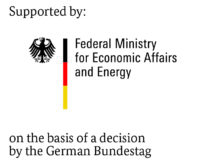Paraffinic diesel fuels
Investigation and description of the solubility behavior of paraffinic diesel fuels
Brief description
In order to achieve the goals of the German Climate Protection Act, a significantly increasing share of alternative and innovative drive systems and fuels is required in the transport sector. In addition to the market introduction and spread of electric vehicles, alternative, advanced renewable fuels can also contribute to greenhouse gas reduction. As a result, the share of renewable components is increasing, especially in diesel fuel, and will grow continuously in the coming years. The focus here is on paraffinic fuel components from various sources and produced using different processes. Examples are hydrogenated vegetable oils (HVO) from cultivated biomass and products of Fischer-Tropsch synthesis (FTS products). HVO and FTS products are, from a chemical point of view, paraffinic components that are characterized, among other things, by outstanding application properties (e.g. high ignition readiness, high energy density, etc.) especially for the middle distillate range.
According to the definition in the German 10th Federal Immission Control Ordinance, a diesel fuel must consist of at least 70 % mineral oil, so for the time being only the admixture of paraffinic components up to 30 % in diesel fuel is possible. However, the increase of mainly n-/iso-paraffinic components in diesel fuel leads to a noticeable decrease in the aromatics content and thus in the solubility of the fuel blends. In addition, crystallization of paraffinic fuel components can occur at low temperatures and lead to a change in cold stability in blends with other fuels. Therefore, the systematic investigation of the influence of higher proportions of n- or iso-paraffinic fuel components on these central fuel properties is the subject of this project.
Aims of the project
The aim of the project is a structured investigation and the creation of basic knowledge on the influence of higher proportions of n-paraffinic and iso-paraffinic components (or lower aromatic proportions) in diesel fuels on key fuel properties. The focus of the project is on investigations of
- water absorption and turbidity behavior
- crystallization of paraffinic components
- Phase stability and solubility
The investigation of fuel blends with a high alternative content is intended to help increase the non-mineral oil content of available diesel fuel to the maximum of 30% specified in the 10th BImSchV and beyond in the future, without compromising the operational safety of diesel engines. The main findings of the project can also be applied to the space heating market (EL heating oil), as the products diesel and EL heating oil are chemically almost identical.
Work tasks OWI
- Determination of a matrix of test fuels
- Investigation of fuel opacity due to water emulsions
- Investigations to clarify the effects of different kerosene contents and distributions on the crystallization behavior during cooling down
- Determination of the solubility behavior of the fuels as a function of varying n-paraffin content
Research institution
OWI Science for Fuels gGmbH
Project funding
The IGF project 21666 N of the research association German Society for Petroleum and Coal Science and Technology e.V. – DGMK, Überseering 40, 22297 Hamburg was funded through the AiF as part of the program for promoting joint industrial research (IGF) by the German Federal Ministry of Economics and Energy based on a German Federal Parliament resolution.

Project duration
03/ 2021 until 08/ 2023
Contact
Dipl.-Ing. Sebastian Feldhoff
Tel.: +49 2407 9518117
email: S.Feldhoff@owi-aachen.de
